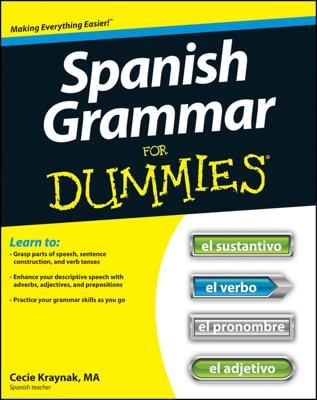What are you doing right now? You are reading about Spanish verbs. The verb phrase “are reading” uses the present progressive tense. The present progressive tense expresses an action that’s taking place right now. Contrast this with the present tense that describes a current action or an action that you perform on a regular basis, such as “I wash dishes.”
You form the present progressive by taking the present tense of the verb estar (to be) and the present participle, or -ing form, of the action verb. When you put these two together, you have to be + doing. Whoever or whatever is performing the action determines the form of estar — which happens to be irregular in the present tense — that you use. First of all, here are the forms of estar:
| estoy | estamos |
| estás | estáis |
| está | están |
| Yo estoy. = I am. |
The second part of this structure consists of the present participle, or -ing form, of the action verb, which you form by dropping the -ar off the infinitive form of the verb and then adding -ando. For -er and -ir verbs, you drop the -er or -ir ending and add -iendo. Use the following examples as your guide:
hablar (to speak) becomes hablando (speaking)
comer (to eat) becomes comiendo (eating)
escribir (to write) becomes escribiendo (writing)
When you put it all together, you get the present progressive:
Yo estoy hablando. = I am talking.
Él está comiendo. = He is eating.
Ellos están escribiendo. = They are writing.
Of course, every crowd has its exceptions. The following table lays out many of the most common irregular present participles.
| Infinitive | Translation | Present Participle | Translation |
|---|---|---|---|
| Caer | to fall | cayendo | falling |
| Construer | to construct | construyendo | constructing |
| Corregir | to correct | corrigiendo | correcting |
| Creer | to believe | creyendo | believing |
| Decir | to say, to tell | diciendo | saying, telling |
| Destruir | to destroy | destruyendo | destroying |
| Dormer | to sleep | durmiendo | sleeping |
| Ir | to go | yendo | going |
| Leer | to read | leyendo | reading |
| Mentir | to lie, to tell a falsehood | mintiendo | lying |
| morir | to die | muriendo | dying |
| oír | to hear | oyendo | hearing |
| pedir | to ask for, to request | pidiendo | asking for, requesting |
| poder | to be able | pudiendo | being able |
| reír | to laugh | riendo | laughing |
| repetir | to repeat | repitiendo | repeating |
| seguir | to follow | siguiendo | following |
| sentir | to feel | sintiendo | feeling |
| servir | to serve | sirviendo | serving |
| traer | to bring | trayendo | bringing |
| venir | to come | viniendo | coming |

